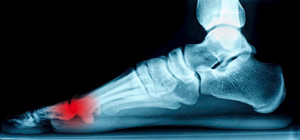Sesamoiditis causes pain in the ball of the foot due to pressure on the sesamoid bones beneath the big toe. This condition is an overuse injury and is common among athletes who participate in activities which put pressure on the ball of the foot such as running, ballet, and basketball. Sesamoiditis is diagnosed through a physical examination. The doctor may also take X-rays of your foot in order to rule out a fracture. When sesamoiditis is diagnosed, treatment is typically conservative. You may be required to rest the affected foot and modify your daily activities and footwear to reduce pressure on the sesamoids. Your doctor may also suggest wearing orthotic inserts in your shoes in order to cushion the foot. If you suspect that you have sesamoiditis, it is recommended that you see a podiatrist for treatment.
Sesamoiditis is an unpleasant foot condition characterized by pain in the balls of the feet. If you think you’re struggling with sesamoiditis, contact one of our podiatrists of Livingston Foot Care Specialists. Our doctors will treat your condition thoroughly and effectively.
Sesamoiditis
Sesamoiditis is a condition of the foot that affects the ball of the foot. It is more common in younger people than it is in older people. It can also occur with people who have begun a new exercise program, since their bodies are adjusting to the new physical regimen. Pain may also be caused by the inflammation of tendons surrounding the bones. It is important to seek treatment in its early stages because if you ignore the pain, this condition can lead to more serious problems such as severe irritation and bone fractures.
Causes of Sesamoiditis
- Sudden increase in activity
- Increase in physically strenuous movement without a proper warm up or build up
- Foot structure: those who have smaller, bonier feet or those with a high arch may be more susceptible
Treatment for sesamoiditis is non-invasive and simple. Doctors may recommend a strict rest period where the patient forgoes most physical activity. This will help give the patient time to heal their feet through limited activity. For serious cases, it is best to speak with your doctor to determine a treatment option that will help your specific needs.
If you have any questions please feel free to contact our office located in North Bellmore, NY . We offer the newest diagnostic and treatment technologies for all your foot and ankle needs.
